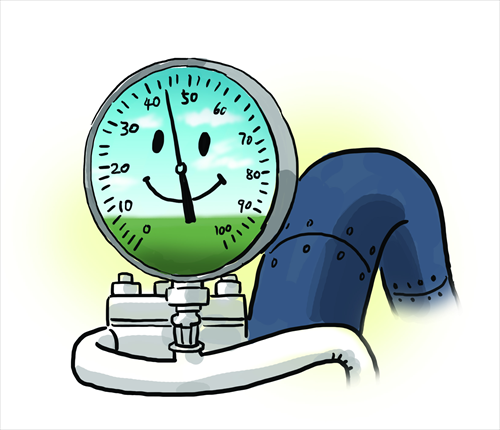Sino-Russian accord putting West under colossal pressure

Illustration: Liu Rui/GT
The period after the fall of the Berlin Wall in 1989 has seen the West enjoy its victory in the Cold War and attempt to shape the world accordingly. Signs of superiority in its approach versus other countries - principally Russia - have been evident.
The situation in Ukraine offers a characteristic example at the communication level. Regardless of whether someone agrees with the position of the West or Russia, three critical questions are raised on the stance of the former.
First, why is the removal of former president of Ukraine Viktor Yanukovych considered a natural response to the public reaction in the Maidan, but not as a coup d'état against a democratically elected leader?
Second, why are demonstrations in Kiev framed from the perspective of democracy but referenda in Crimea, Donetsk and Lugansk are regarded as almost illegal actions and are not recognized? And third, why are Nazi elements of Kiev's government silently supported while fascist politicians in other countries of the world are openly condemned?
In theory, a comprehensive and firm policy from the West would not have allowed those questions to be posed. Hard reality, however, demonstrates that different answers are given in different situations.
The Western estimation has been that Europe constitutes a panacea for Russia, making it almost obligatory for President Vladimir Putin to closely cooperate with it. Subsequently, European politicians tend to argue that Moscow needs Brussels much more than Brussels needs Moscow. Nonetheless, the gas accord between Beijing and Moscow highlights the existing margin for maneuvers in international politics.
The signed contract for the supply of Russian gas to China has not been a welcome development in the West as the media coverage indicates.
Before the historical agreement was reached, various European media had emphasized the potential cancellation as a perceived indication of unbridgeable differences between the two countries.
Reuters, for instance, referred to a failure of negotiations only a few hours prior to its conclusion, while the Times was quick in seeing the two sides as unable to agree on terms. Spanish newspaper La Vanguardia commented that "Beijing and Moscow caught the West off guard" and concentrated on the "tremendous performance in Shanghai."
The Sino-Russian deal almost shocked the West because it is challenging conventional wisdom that rising powers such as Russia and China are lacking alternatives and should only follow the Western way.
The French newspaper Le Monde predicts an ideological battle between the West on the one hand and China and Russia on the other.
For its part, the tabloid Bild considers it as a "warning" for Germany and encouraged the EU to create its own energy space.
Prime Minister of Poland Donald Tusk recently proposed the creation of an energy union as an ideal solution for Brussels to escape from Russian gas dependence.
Apart from their concern on the impact of the Sino-Russian agreement, the European media have also attempted to deconstruct the importance of Beijing and Moscow's initiative.
The Italian Catholic daily Avvenire reports that the energy deal only exists in paper as "at least three and a half years will go by before a single one of the planned 38 billion cubic meters of gas flows through the pipeline."
On the same wavelength, the Financial Times focuses on the secret content of economic terms agreed and endeavors to reveal that China might face problems in its trade relations with the US as a consequence of its accord with Russia.
All in all, the European media coverage of the Sino-Russian accord shows that the West has started to seriously take into account the new foreign policies of China and Russia even if it plays them down. The response of these countries to the Western-led communication war is not a vocal one. By contrast, it is based on deeds. The multipolar world is gradually taking shape and the media cannot help but cover its formation.
The author is a journalist based in Athens, Greece. opinion@globaltimes.com.cn